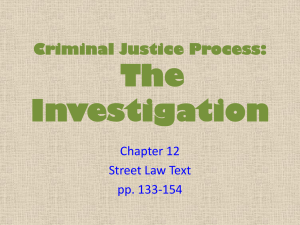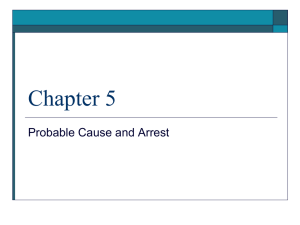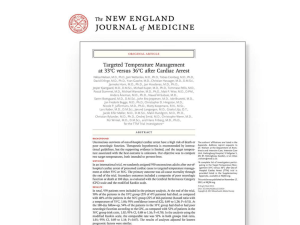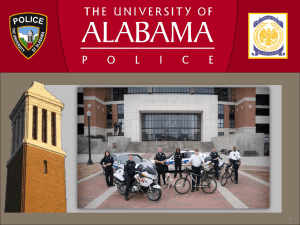Powers of Arrest
advertisement
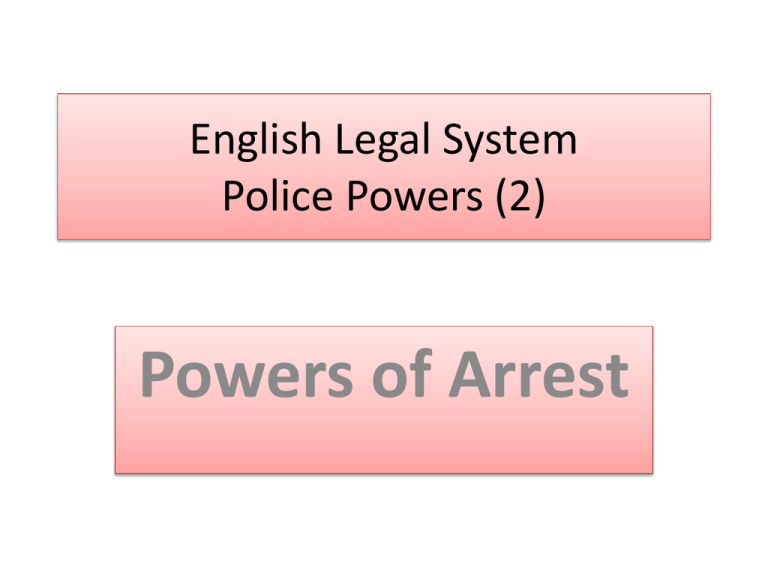
English Legal System Police Powers (2) Powers of Arrest Homework • The topic is citizen’s arrest. I would like you to produce a guide aimed at young people, explaining when a private citizen can arrest someone, and the limitations on this power. Please take care to use recent Acts (references to s25 of PACE are outdated, and no longer exist) and refer to at least one case. • Remember that you should also include a reference to the two most useful sources you used. – If you are using a website (you should use a range of sources) then you will need the full URL – If you are referencing books, you should follow the example below: Fyfe, D Mrs Fyfe’s Fantastic Guide to Law (Penguin, London 2012) Help with the Task o A legal guide to citizen’s arrest Guardian.co.uk o R v Self 1992 http://www.rjerr ard.co.uk/law/cases/s elf.htm o Martin, J AS Law for OCR (2nd edition; Hodder Education 2011) p/46 First a quick recap • • • • • • • • • • • • • • • • • • Across 3. Key statute covering the powers of the police to stop & search (4) 4. One of the reasons, which may not be enough under code A to stop & search (8) 7. One of the grounds under which the police may not stop and search alone (4) 8. One of the things, which may be stopped and searched (7) 9. Case confirming that the police must give their name, station and reason (5) 10. You may remove these items if asked (6) 12 ___________________ v Cox. Case which establishes that you can’t be obnoxious if asked a question (8) 13. Type of force which the police may use to stop & search (10) 14. Type of record which should be given to the suspect (7) Down 1. Initials of an Act which gives the police more powers to stop and search. (5) 2. Type of substance which may be searched for under the Misuse of Drugs Act 1971. (10) 3. Type of area where a suspect may be stopped and searched. (6) 5. Act which has recently been reformed to improve (!!!) the protections for stop and search (9) 6. One of the things which may be stopped and searched for (bang!!) (9) 11. Right which was the subject of a successful challenge to the old terrorism stop and search powers By the end of this, you will be able to: • Explain when the police can arrest an individual with a warrant • Explain when the police can arrest an individual without a warrant • Understand how the common law powers of arrest for breach of the peace operate • Describe the manner in which the police must arrest people • Evaluate these powers and how effective they are What is the purpose of an arrest? Power One: Breach of the Peace “An act done or threatened to be done which either actually harms a person, or in his presence, his property, or is likely to cause such harm being done” Do these common law powers apply to private premises? McConnell v CC of Greater Manchester (1990) Power two: Arrest WITH a warrant Magistrate’s Act 1980 s.1 Power three: Arrest WITHOUT a warrant Now…… Can you complete the following tasks? • Under the new section, the police can arrest, without a warrant: • When can the police arrest a suspect now? • What do you think of the changes? • Why might they have been introduced? Although the police do retain a great deal of discretion over when to arrest or not. Who can they now arrest? Situation One: Present or future situations Situation Two: Past situations Situation Three: Past possible situations (a) Anyone who is about to commit an offence (b) Anyone who is in the act of committing an offence (c) Anyone whom he has reasonable grounds for suspecting to be about to commit an offence (d) Anyone whom he has reasonable grounds for suspecting to be committing an offence (a) Anyone who is guilty of the offence (b) Anyone whom he has reasonable grounds for suspecting to be guilty of it A constable has reasonable grounds for suspecting that an offence has been committed, he may arrest anyone without a warrant whom he has reasonable grounds to suspect is guilty of it In summary A police constable may arrest, without a warrant: –Anyone who he reasonably suspects has committed, is committing, or is about to commit an offence. Isn’t that a little on the broad side?!!! Because the powers are broader, we need a limitation…… Even if s.24 applies, the PC can only arrest if it is NECESSARY on REASONABLE GROUNDS to arrest them on one of the following grounds…. This is known as the NECESSITY TEST and is so important that it isn’t just in s.24, but also in Code G. When might an arrest be ‘necessary’? To discover the name or address of the suspect To prevent prosecution being hindered by the disappearance ….. To protect a child or vulnerable person To allow for the prompt & effective investigation of the offence or person’s conduct To prevent the suspect: 1. Causing physical harm to himself or others 2. Suffering physical injury 3. Causing loss or damage to property 4. Committing an offence against public decency 5. Causing an unlawful obstruction of the highway Are there any limitations under SOCPA 2005? AO2: Does the ‘necessary’ condition impose enough limitations? What is reasonable suspicion? When might an arrest NOT be necessary? “known facts or information” G v DPP 1989 Are these arrests necessary? • PC Bob is walking past a house when he sees Jim up a ladder leaning in a window. He asks him to come down and for some ID. However, Jim has no ID, and no keys. PC Bob arrests him for attempted burglary. • PC Bob sees Jane hit John in the face with a fist, breaking his nose. He arrests Jane. At the trial Jane is acquitted as it turned out she was defending herself after John tried to rob and assault her. • PC Bob receives information that a tall man with green hair is wanted in connection with a serious assault which took place earlier in the day. He sees Louis, who is 6ft 7in and has green hair, he arrests him. Manner of arrest Manner? The police may use… Protects the individual’s rights by… Any problems? (wood v DPP (2008)) The police must take the suspect….PACE 1984 The police may search for.. The police must give them the…. Caution – do you know the words! The police must make a …. This should include…. The police must tell them… Taylor v CC of Thames Valley Police (2004) Remember: the police don’t have to arrest you. What else could they do? (AO2): Does arrest work? The necessity test Who is most likely to be prosecuted? There are a lot of safeguards Look at each of the following statements and add your own thoughts Ethnic monitoring of arrested persons Use of police discretion 17.6% of arrests end in conviction Can you be arrested for the following? You are about to rob an old lady You have been identified (wrongly) as being involved in a murder You are drunk You tell the police your name is HRH Elizabeth Windsor You tell the police that you live at 10 Downing Street, Westminster You urinate in the street How much do you recall? The purpose of arrest is… A warrant, under s.24 PACE 1984 The common law power is… Arrestable offences They may also arrest using a … s.110 Serious Organized Crime and Police Act 2005 Finally, they can arrest without.. Warrant, under s.1 Magistrates Act 1980 Though this only used to be available for … Arrest in breach of peace But this changed under…. Any offence Which allowed them to arrest for… To allow the police to investigate behaviour and protect the public Are these legal arrests Purpose of an arrest? Manner Common law powers Arrest with a warrant Powers of the police to arrest…. AO1 Brainstorm Arrest without a warrant necessity Exam Question Describe the powers of the police to arrest a person on the street [18] After an incident in which a man was stabbed and seriously hurt, a police officer grabs hold of Damon. When Damon protests, and asks why the police officer says “you know what it’s for”. The police officer did not see the incident but was told by someone else at the scene that Damon was responsible. Advise Damon as to the lawfulness of his arrest. [12] What can you tell me about the marks and demands of each of these questions? Describe the powers of the police to arrest a person on the street [18] After an incident in which a man was stabbed and seriously hurt, a police officer grabs hold of Damon. When Damon protests, and asks why the police officer says “you know what it’s for”. The police officer did not see the incident but was told by someone else at the scene that Damon was responsible. Advise Damon as to the lawfulness of his arrest. [12]
